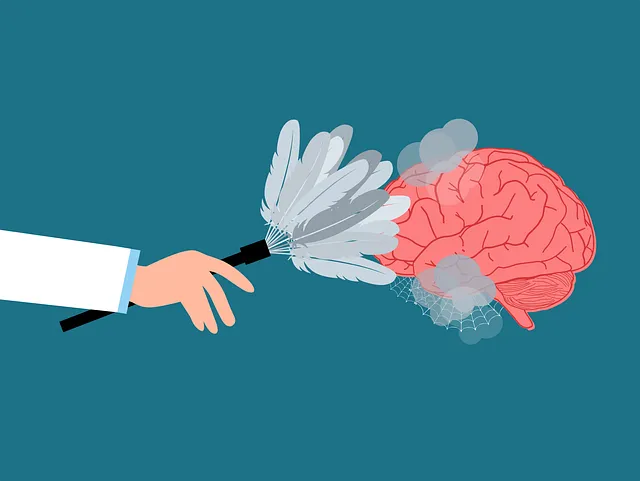The media's portrayal of mental illness significantly shapes public understanding, with positive representations encouraging empathy and help-seeking behaviors, while negative depictions perpetuate stigma. Tools like Compassion Cultivation Practices and Healthcare Provider Cultural Competency Training are crucial for empathetic care. Openly discussing mental health challenges, as promoted by the Mind Over Matter principle, fosters understanding and early intervention. In the digital age, media should adopt Mind Over Matter principles, showcase recovery journeys, and encourage conversations about diverse disorders to improve public support. Centennial Kaiser Permanente's holistic mental health initiatives, including tailored services, screenings, and workshops, exemplify destigmatization efforts. By partnering with mental health professionals, media can create nuanced, authentic narratives challenging negative stereotypes, fostering a more supportive societal environment for improved mental wellness.
“The media plays a powerful role in shaping public understanding of mental illness, influencing perceptions and attitudes towards those living with these conditions. This article delves into the complex relationship between media representation and mental health, exploring how current depictions impact societal views. We examine the efforts of organizations like Centennial Kaiser Permanente, known for its comprehensive mental health coverage, to challenge negative stereotypes. Through a combination of strategies, including collaboration with media outlets and healthcare providers, we discuss ways to enhance accurate representation, ultimately fostering a more compassionate and informed society.”
- Understanding the Impact of Media Portrayal on Mental Health Perception
- Exploring the Current State: Media's Depiction of Mental Illness
- Centennial Kaiser Permanente's Approach to Mental Health Coverage
- Strategies for Enhancing Accurate Mental Illness Representation in Media
- Fostering Change: Collaborating with Media and Healthcare Providers
Understanding the Impact of Media Portrayal on Mental Health Perception

The media plays a significant role in shaping public understanding and perceptions about mental health. The way mental illness is represented in movies, television shows, and news articles can either perpetuate harmful stereotypes or foster empathy and awareness. Positive media portrayal, such as characters navigating their conditions with strength and resilience, can inspire hope and encourage those struggling to seek help. On the other hand, negative or inaccurate representations can lead to stigmatization, discrimination, and a misinformed public.
Centennial Kaiser Permanente’s mental health coverage highlights the importance of accessible healthcare services. However, for these services to be effectively utilized, the broader societal narrative surrounding mental illness must be compassionate and supportive. Compassion Cultivation Practices and Healthcare Provider Cultural Competency Training are essential tools in ensuring professionals can offer empathetic care. By fostering an environment where mental health is openly discussed, we can challenge harmful narratives and promote understanding, ultimately encouraging early intervention and better outcomes for those facing mental health challenges, in line with Mind Over Matter principles.
Exploring the Current State: Media's Depiction of Mental Illness

In today’s digital age, media plays a significant role in shaping public perception about mental illness. The current state of representation is a mix of progress and challenges. While there has been an increase in the number of stories featuring characters with mental health struggles, these portrayals often fall into stereotypical traps. Media platforms, like television and film, have historically used mental illness as a plot device for drama or as a source of comic relief, rarely presenting a nuanced view. This oversimplification can lead to misconceptions and stigmatization, hindering the understanding and support needed in communities, even with the improved Centennial Kaiser Permanente mental health coverage.
Building empathy is crucial, and there are effective strategies to achieve this. By incorporating Mind Over Matter principles and showcasing characters on their journey to recovery, media can foster a deeper level of comprehension. Encouraging open conversations about various mental health conditions, including less-understood disorders, can help in the Coping Skills Development. Representations that go beyond labels and stereotypes are essential to promoting mental wellness and ensuring those affected feel seen and heard.
Centennial Kaiser Permanente's Approach to Mental Health Coverage

Centennial Kaiser Permanente has taken a commendable step towards improving mental health coverage and accessibility by implementing comprehensive initiatives. Their approach emphasizes a holistic view of wellness, recognizing that mental illness is a significant aspect of overall health. The organization offers a range of services tailored to meet various needs, from individual therapy sessions to support groups. One notable strategy is their focus on early intervention, aiming to identify and address mental health concerns before they escalate. This proactive method includes regular Screenings and Mental Wellness Coaching Programs Development, empowering individuals to take charge of their mental well-being.
Additionally, Centennial Kaiser Permanente facilitates Stress Management Workshops Organization, providing practical tools and communication strategies to help members cope with daily stressors. These workshops foster a sense of community and offer valuable resources for those seeking to enhance their mental resilience. By combining access to professional services with educational initiatives, the organization is making significant strides in challenging stigma and promoting open conversations about mental illness.
Strategies for Enhancing Accurate Mental Illness Representation in Media

Media plays a significant role in shaping societal perceptions about mental health. To foster a more understanding and empathetic culture, it’s crucial to enhance accurate representation of mental illness in various forms of media. One effective strategy is to involve individuals with lived experiences of mental health conditions in the creative process. Their unique insights can ensure narratives are authentic and avoid stereotypes. Additionally, media organizations should partner with mental health professionals and advocacy groups to gain guidance on best practices.
Centennial Kaiser Permanente’s mental health coverage initiatives emphasize the importance of destigmatization through comprehensive services. This includes promoting Self-Awareness Exercises, Stress Management Workshops, and Organization-led Mental Wellness Journaling Exercises. By integrating such initiatives, media can move beyond simplistic portrayals and offer nuanced representations that reflect the complexity of mental illness. Encouraging open dialogue and providing accurate guidance are key to challenging negative stereotypes and fostering a more supportive societal environment.
Fostering Change: Collaborating with Media and Healthcare Providers

In the battle against the stigma surrounding mental illness, a collaborative effort between media outlets and healthcare providers is a powerful tool for fostering change. Centennial Kaiser Permanente’s commitment to mental health coverage leads by example, demonstrating that open dialogue about mental wellness can transform societal perceptions. By joining forces, these entities can challenge harmful stereotypes often portrayed in media, especially in the realm of television and film. This collaboration encourages the development of more nuanced and accurate representations of various mental health conditions, such as depression prevention strategies highlighted in popular culture.
One effective initiative could be the production of a Mental Wellness Podcast Series, where healthcare professionals discuss Self-Care Routine Development for Better Mental Health. Such platforms can educate listeners, offer support, and inspire conversations that promote understanding and empathy. Through these collaborative efforts, media has the potential to revolutionize how mental illness is portrayed, ultimately contributing to improved access to care and enhanced mental wellness for all.
Media representation of mental illness plays a pivotal role in shaping public perception and understanding. By highlighting the efforts of organizations like Centennial Kaiser Permanente, who advocate for comprehensive mental health coverage, we can foster a more nuanced and accurate depiction in media. Through collaborative strategies involving media outlets and healthcare providers, we have the power to revolutionize how mental illnesses are portrayed, ultimately reducing stigma and improving support systems for those seeking help. This holistic approach is essential to creating a more inclusive and empathetic society.






